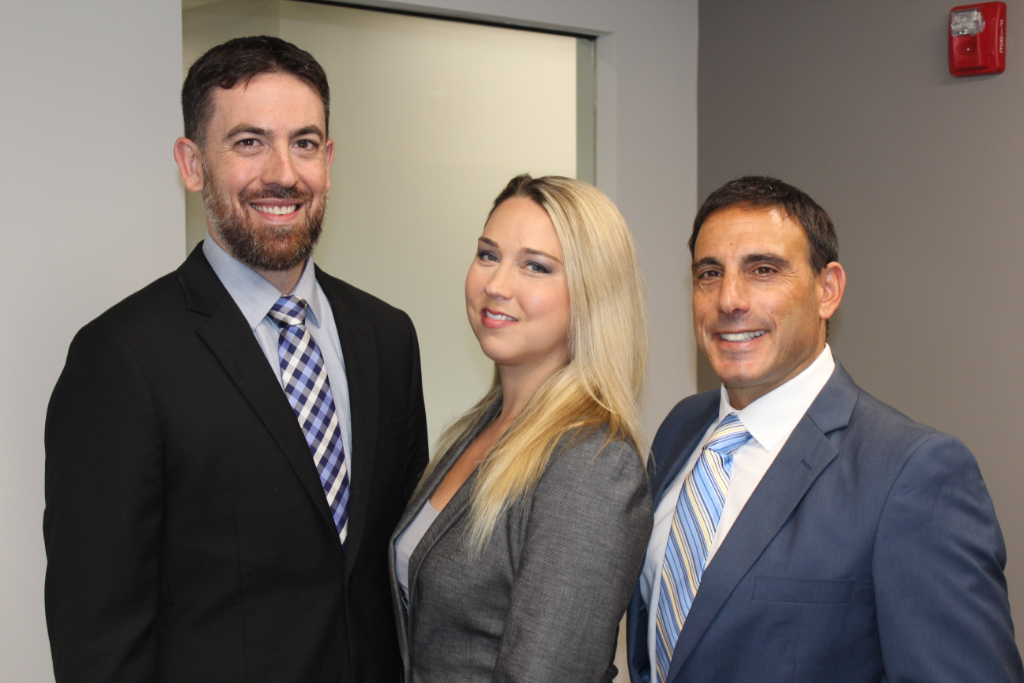Sexual Harassment Lawyer Tampa, FL
 Our Tampa, FL sexual harassment lawyer knows that when you step foot into your office, you have the right to feel safe while you are there. While safety may take on many forms, one that is especially concerning is sexual harassment. If another employee is making you feel uncomfortable while you are at work and is sexually harassing you, it is time for this to end. Reach out to the Hoyer Law Group, PLLC for more information and to speak with us about filing charges against the other party.
Our Tampa, FL sexual harassment lawyer knows that when you step foot into your office, you have the right to feel safe while you are there. While safety may take on many forms, one that is especially concerning is sexual harassment. If another employee is making you feel uncomfortable while you are at work and is sexually harassing you, it is time for this to end. Reach out to the Hoyer Law Group, PLLC for more information and to speak with us about filing charges against the other party.
Am I protected under Florida Law regarding sexual harassment?
Absolutely. You have the right to go to work without being sexually harassed.
What does it mean to be sexually harassed?
Many employees choose not to file charges against someone else at work because they do not believe what has happened to them constitutes sexual harassment. Sexual harassment can come in many forms, including:
- Sexually explicit jokes. If you are being subjected to another employee (or your employer) making sexually explicit jokes or comments, this constitutes sexual harassment. Another co-worker may make objectifying comments about employees or talk inappropriately.
- Inappropriate gestures. If someone is verbally harassing you or even making inappropriate, explicit gestures, this can be sexual harassment.
- Employer harassment. If your employer is withholding a raise or promotion if you do not give them sexual favors, this is sexual harassment.
Is there a statute of limitations on workplace sexual harassment?
There is and this is one of the reasons it is so important to speak with your Tampa sexual harassment lawyer as soon as possible. You will have 1 year–365 days–to file a sexual harassment claim from the day of your last sexual harassment incident.
Who can I turn to?
Call our office now. Being in this situation can be tricky because you may be wondering if you are “being dramatic” or if you are rocking the boat. However, society has instilled in many people the notion that if they are unaccepting of other people’s harassment, they are being dramatic. If someone else put you in a situation at work where you feel uncomfortable because they are sexually harassing you, you have the right to speak up. You deserve to go to work and feel safe. This applies to all employees, regardless of gender. Many men are too afraid to speak up because they are worried they may be perceived as weak or that a woman could not sexually harass them. This is not the case.
What can I do?
When you are concerned for your safety at work, call the team at Hoyer Law Group, PLLC now. You shave the right to go to work and not be concerned that someone there will be sexually explicit or sexually harass you. It is crucial that you get the legal help you need when you are being sexually harassed at work. For more information on how we can help in your specific situation, reach out to our Tampa sexual harassment lawyer now.
What Is Workplace Sexual Harassment?
A Tampa, FL sexual harassment lawyer knows that over the past several years, the secrecy surrounding workplace sexual harassment has been ripped wide open, leading to the #metoo movement. Every type of industry has been infected with the issue, affecting hundreds of thousands of women and men. At Hoyer Law Group, PLLC, we work diligently to get sexual harassment victims the financial justice they deserve, aggressively advocate for victims of workplace sexual harassment, and understand how devastating its effects can be on victims.
According to the United States Equal Employment Opportunity Commission (EEOC), sexual harassment is defined as any “unwelcome sexual advances, requests for sexual favors, or other verbal or physical conduct of a sexual nature” when one or more of the following circumstances exist:
- The perpetrator lets the victim know, either implicitly or explicitly, that submitting to the conduct is a condition of the victim’s employment
- The perpetrator lets the victim know, either implicitly or explicitly, that Submitting or rejecting of the conduct by an victim is used as the basis for decisions affecting the employment of the victim
- The effect of the purpose of the perpetrator’s conduct is to either substantially interfere with the victim’s work performance or to create a hostile, offensive, or intimidating work environment
Tampa Sexual Harassment Statistics
A Tampa sexual harassment lawyer is aware that statistics reveal that 40 to 60 percent of women in the workforce have experienced at least one incident of sexual harassment; however, it is believed the number is much higher since many victims never report the harassment.
There are several different types of harassment that fall under this category:
- Seductive behavior – The abuser makes inappropriate and unwanted sexual advances. The victim is barraged with date requests, sexual invitations, phone calls, text messages, emails, and gifts.
- Sexual Bribery – The abuser promises the victim a reward in return for sex. They may be blatant in their offer, or they may attempt to come across subtly.
- Sexual Coercion – The abuser threatens retribution, such as withholding promotions or raises, poor job evaluation, or job termination, unless the victim consents to sexual activity.
- Sexual Imposition – Forceful touching, feeling, grabbing, or sexual assault.
Another form of behavior that many people do not realize falls under sexual harassment is called gender harassment. Sexist comments or comments that are degrading to one gender or another are types of sexual harassment. This can take place in the form of obscene and inappropriate jokes, insults, or graffiti.
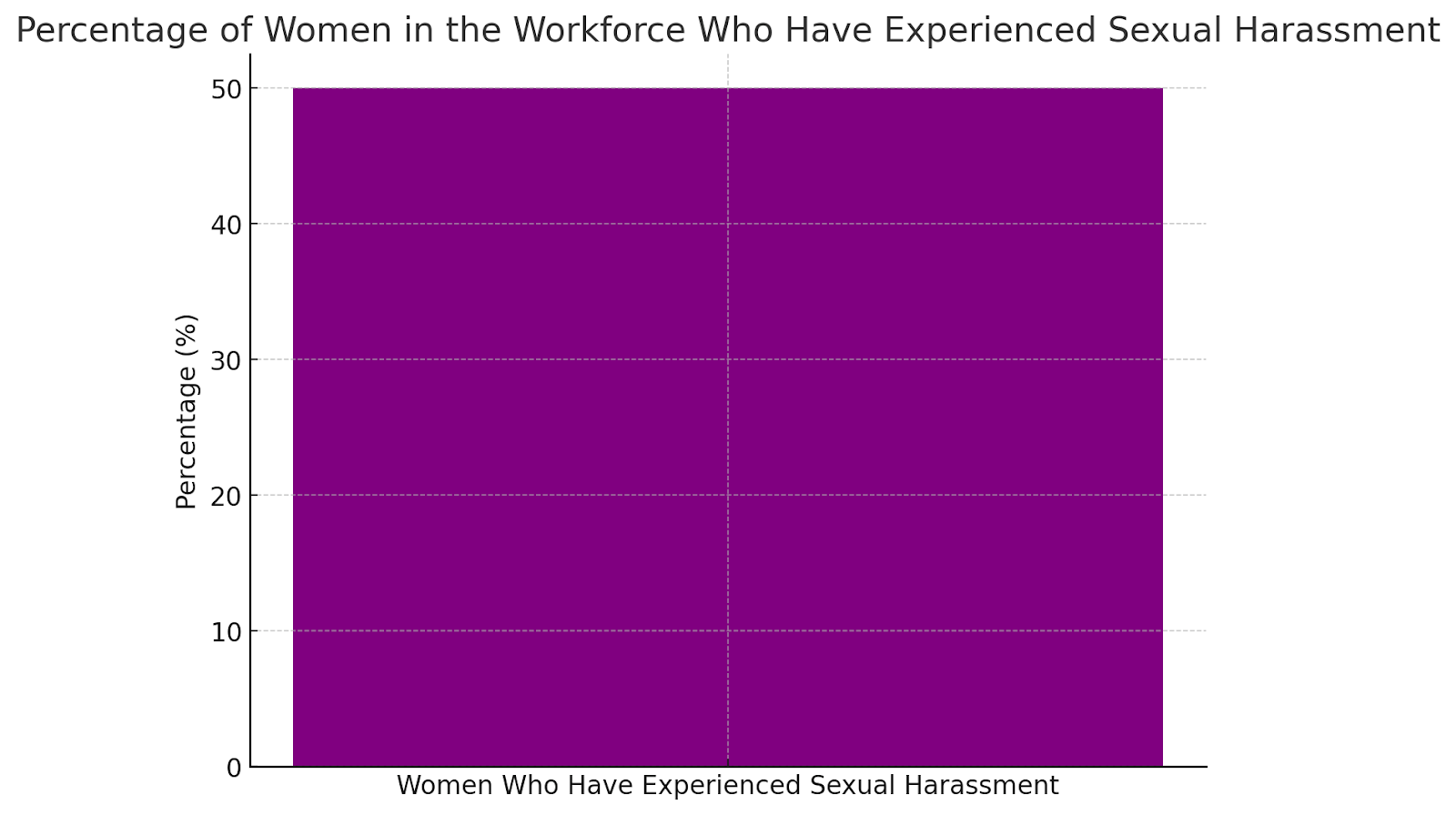
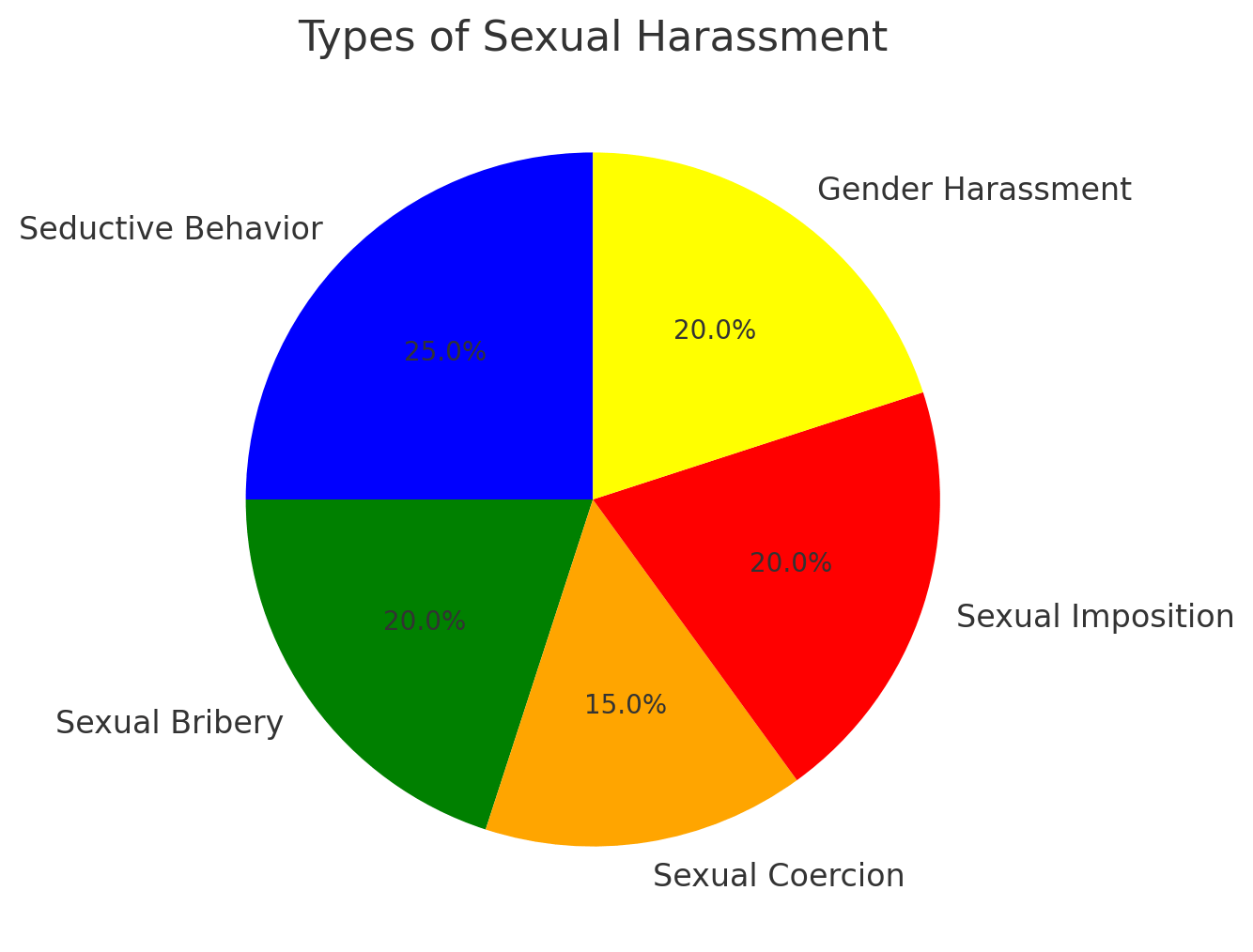
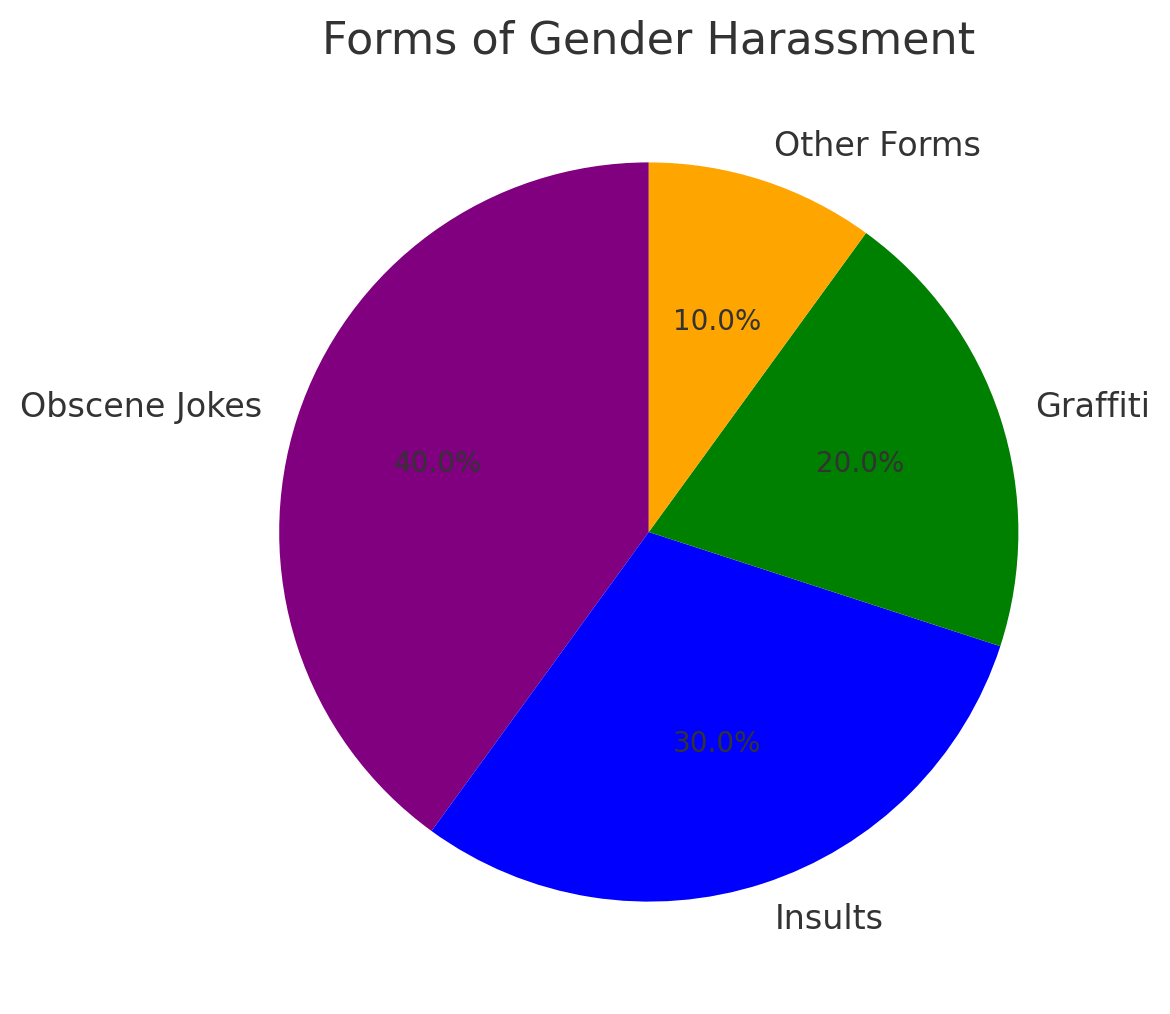
Have You Been a Victim?
Tragically, anyone can be a victim of sexual harassment. How a person dresses or acts has nothing to do with being targeted. Different research that has been done has found that victims of sexual harassment are varied – there is no specific body type, age, or dress style that factors into a person becoming a victim.
If you’ve been a victim of sexual harassment at your workplace, contact a Tampa sexual harassment lawyer to find out what legal action you may be able to take against your employer. Call Hoyer Law Group, PLLC to find out what legal recourse you may have.
Signs Of Sexual Harassment
As a Tampa, FL sexual harassment lawyer can explain, sexual harassment is a serious issue that can occur in various settings, including the workplace, schools, public spaces, and online. This form of harassment can impact victims and survivors in many ways, from their personal life to their career. It’s crucial to be aware of the signs of sexual harassment so that you can recognize when it occurs and take appropriate action. Common signs of sexual harassment are detailed below.
- Unwanted sexual advances: Any sexual verbal comments and actions that are not welcome and directed toward a specific person can be considered sexual harassment. It may be subtle or overt, but if it makes you uncomfortable and is unwanted, it can be considered sexual harassment.
- Inappropriate comments or jokes: Sexual innuendos, lewd jokes, or comments about a person’s body or appearance that are unwelcome can be considered sexual harassment. Whether they happen in person, through electronic communication or over the phone, they are not appropriate to make.
- Persistent and unwanted attention: If someone is constantly trying to engage you in conversations or activities of a sexual nature, despite your lack of interest or refusal, it may be a sign of sexual harassment.
- Intimidation or threats: Making threats against a person if they do not reciprocate or acknowledge sexual advances or comments. It may also involve using power or authority to pressure someone into engaging in sexual activities.
- Unwanted touching or physical contact: Any form of touching or physical contact, such as touching someone’s body, hugging, kissing, or grabbing without their consent, is a clear sign of sexual harassment, as a Tampa sexual harassment lawyer can explain.
- Invasion of privacy: This can involve invading someone’s personal space, such as standing too close, peeking into someone’s private area, or spying on them in a private setting, which can be considered sexual harassment.
- Displaying sexually explicit materials: Showing or sharing sexually explicit materials, such as pornographic images or videos, without consent, especially in a professional or educational setting, can be a form of sexual harassment.
- Pressure for sexual favors: Requests or demands for sexual favors, such as offering a promotion or other benefits in exchange for sexual activity, is a blatant form of sexual harassment.
- Unwanted online advances: This can include sending explicit messages, photos, or videos, making unwelcome comments, or stalking someone online. It’s important to remember that sexual harassment can occur online as well as offline.
- Hostile or offensive work or learning environment: Creating a hostile or offensive environment through the use of sexual comments, jokes, or behavior, even if not directed at an individual, can still be considered sexual harassment.
Sexual harassment can take many forms and can happen in various settings. Knowing how to recognize the signs of sexual harassment is crucial so that the appropriate and urgent actions can be taken to address them. If you experience any of the signs mentioned above, it’s crucial to seek support from a trusted person, report the harassment to the appropriate authority, and take steps to protect yourself. Remember, everyone has the right to work, learn, and live in an environment free from sexual harassment, so if you have experienced harassment contact a Tampa sexual harassment lawyer such as one from Hoyer Law Group, PLLC.
Tampa Sexual Harassment Infographic
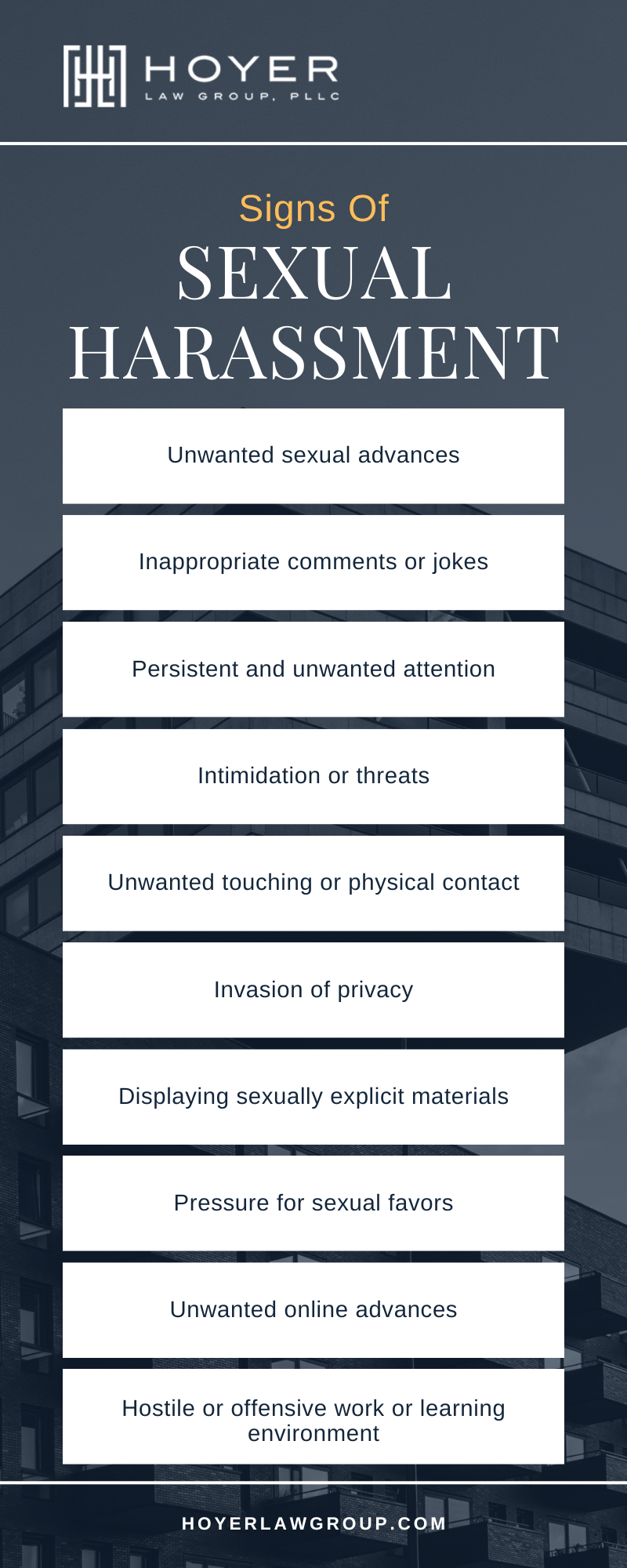
What Compensation Can I Expect From A Sexual Harassment Lawsuit?
Sexual harassment in the workplace can have a profound impact on a person’s life, affecting their career, emotional well-being, and personal relationships. Filing a lawsuit against an employer or harasser is a step toward holding them accountable and seeking justice for the harm caused. At Hoyer Law Group, PLLC, we’re here to help you understand what compensation may be available if you’ve been subjected to this behavior. Below, we address common questions about potential damages in these cases.
What Types Of Damages Are Typically Awarded In Sexual Harassment Cases?
Damages in sexual harassment lawsuits generally fall into two categories: economic and non-economic. Economic damages compensate for tangible losses like lost wages, reduced earning potential, or job loss due to harassment. Non-economic damages address emotional suffering, mental anguish, and the loss of enjoyment of life caused by the harassment. Courts consider both types of damages when determining a fair award.
Can I Recover Lost Wages From My Employer?
Yes, lost wages are a common form of compensation in these cases. If the harassment caused you to leave your job or resulted in a demotion, you may be entitled to recover past and future lost wages. This includes pay you would have earned had the harassment not occurred, as well as benefits like health insurance or retirement contributions that you lost because of your employment changes.
Are Punitive Damages Possible In Sexual Harassment Lawsuits?
Punitive damages may be awarded in cases where the harasser’s behavior was particularly egregious or the employer failed to take appropriate action to address the situation. These damages are meant to punish the wrongdoer and deter similar behavior in the future. While not guaranteed, they are a possibility in cases where the court finds the actions especially harmful.
Can I Recover Compensation For Emotional Distress?
Yes, emotional distress is often a significant part of these cases. The psychological impact of sexual harassment can be long-lasting and deeply damaging. Courts recognize this and may award compensation for the pain and suffering you experienced. Evidence such as therapy records or testimony from mental health professionals can strengthen your claim for non-economic damages.
How Do Settlements Compare To Court-awarded Damages?
Many sexual harassment cases are resolved through settlements rather than going to trial. Settlements often provide quicker resolutions and can include compensation for lost wages, emotional distress, and other damages. However, the amount offered in a settlement may differ from what a court would award. Having a Tampa sexual harassment lawyer to negotiate on your behalf can help you secure a fair outcome.
Sexual harassment cases are deeply personal and require careful attention to the damages that reflect the harm you’ve experienced. At Hoyer Law Group, PLLC, we are committed to helping clients in the city of Tampa pursue the compensation they deserve. If you’ve been a victim of workplace harassment, contact us today to discuss your case with an experienced Tampa sexual harassment lawyer. We are here to help you move forward and protect your rights.

Tampa Sexual Harassment Glossary
At Hoyer Law Group, PLLC, we are dedicated to helping victims of sexual harassment in Tampa, FL, secure justice and protect their workplace rights. Sexual harassment is not only morally wrong but also illegal under both state and federal laws. Below are key legal terms and concepts frequently encountered in workplace sexual harassment cases, along with expanded explanations to help you better understand your rights and protections.
Hostile Work Environment
A hostile work environment occurs when unwelcome sexual conduct or discriminatory behavior creates an intimidating, abusive, or offensive workplace atmosphere. This can include repeated sexual jokes, explicit comments about an employee’s body, inappropriate physical contact, or sharing sexually explicit materials. The behavior does not have to be directed at the victim to qualify; for example, a pervasive environment of inappropriate jokes or materials can contribute to a hostile setting for all employees.
Courts assess the severity and pervasiveness of the conduct by examining the frequency of the actions, whether they were physical or verbal, and the impact on the victim’s ability to perform their job. While isolated incidents might not always meet the threshold, repeated behavior or a single severe act, such as sexual assault, can constitute a hostile work environment.
Quid Pro Quo Harassment
Quid pro quo harassment involves situations where a person in power, such as a supervisor or manager, conditions employment benefits on the acceptance of sexual advances or requests. For example, a supervisor might suggest a promotion is contingent upon going on a date or imply that rejecting advances could lead to job loss.
This form of harassment often involves explicit or implicit threats and can have a chilling effect on victims, who may feel compelled to comply to protect their careers. Federal laws, including Title VII of the Civil Rights Act of 1964, and Florida laws specifically prohibit this type of harassment, recognizing the inherent abuse of authority.
Gender-Based Harassment
Gender-based harassment is a form of discrimination that targets individuals because of their gender. It does not necessarily involve sexual advances or behavior but often includes degrading comments, offensive jokes, or policies that perpetuate stereotypes. Examples include repeated statements that women are “unsuited” for certain roles or exclusion of employees from opportunities based on outdated gender norms.
This type of harassment can create an unequal playing field, making employees feel marginalized and undervalued in their workplace. Gender-based harassment can also escalate into broader patterns of discrimination, affecting pay, promotions, and assignments.
Retaliation
Retaliation occurs when an employer or coworker takes negative actions against an employee for reporting harassment, participating in an investigation, or refusing to engage in sexual conduct. Retaliatory actions can include firing, demoting, reducing work hours, or assigning the employee to undesirable tasks. Even subtle actions, such as excluding an employee from meetings or providing negative references, can qualify as retaliation if they are directly tied to the employee’s report.
Retaliation is a significant concern for many employees, as it can deter victims from coming forward. Both Florida and federal laws provide strong protections against retaliation to encourage reporting and ensure a safe workplace.
Tangible Employment Action
A tangible employment action involves significant, material changes to an employee’s job conditions due to harassment or retaliation. Examples include being fired, demoted, denied a raise or promotion, or even being transferred to a less desirable position without justification. These actions are often used to coerce employees into silence or punish them for rejecting advances or reporting misconduct.
Tangible employment actions are particularly harmful because they affect not only an employee’s immediate job but also their long-term career trajectory and financial stability. In sexual harassment cases, proving that such an action was directly related to the harassment is critical for seeking compensation and justice.


